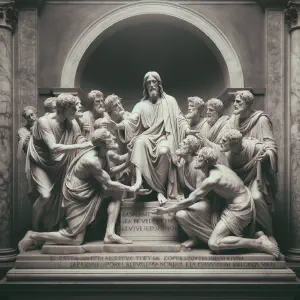The Measure of True Wisdom



However, it was the actions of one, a Samaritan, that highlighted the essence of faith and wisdom. Realizing his healing, he returned, glorifying God. In his act of gratitude, he stood apart from the rest, embodying the true spirit of the teachings. Jesus acknowledged his faith, declaring it as the source of his salvation. This singular act of thankfulness and recognition of God’s grace served as a beacon of hope and a reminder that true wisdom and righteousness lay not in power or authority, but in humble gratitude and unwavering faith in the Lord.
Five Questions
What is the significance of the message given to the kings and princes in the Book of Wisdom?
The message to the kings and princes in the Book of Wisdom serves as a powerful reminder of the responsibility that comes with authority. It emphasizes that those in power are entrusted by God and are accountable to Him for their actions. They are urged to judge rightly and follow God’s law, highlighting the divine expectation that the powerful should use their influence to uphold justice and righteousness.
How does the Psalm reflect on the nature of God’s judgment?
The Psalm portrays God as the ultimate judge who defends the vulnerable and the oppressed. It contrasts the temporal power of earthly rulers with the eternal authority of God. Even those considered as ‘gods’ among men are reminded of their mortality and accountability before the true Most High. This reinforces the idea that God’s judgment is impartial and extends to all, regardless of their earthly status or power.
In the Gospel of Luke, why is the response of the Samaritan leper significant?
The Samaritan leper’s response is significant because it demonstrates gratitude and recognition of Jesus’ divine authority. While all ten lepers were cleansed, only the Samaritan returned to give thanks. This act of gratitude sets him apart and highlights the importance of acknowledging God’s work in our lives. It also breaks cultural barriers, as Samaritans were often looked down upon by Jews, yet in this story, he is the one who exemplifies true faith.
How do these scriptures collectively address the theme of humility?
Collectively, these scriptures emphasize humility as a virtue both in those who wield power and those who seek God’s mercy. The leaders are reminded of their humble duty before God, and the lepers show humility in their plea for healing. The Samaritan leper, in particular, exhibits humility in his return to give thanks, acknowledging his dependence on God’s grace. This theme underscores that true wisdom and righteousness come from a humble recognition of God’s sovereignty and grace.
What is the overarching lesson these readings offer to the faithful?
The overarching lesson from these readings is the call to live a life of righteousness, humility, and gratitude, regardless of one’s status. For those in power, it’s a reminder to exercise their authority justly and in fear of God. For the faithful, it’s a call to acknowledge God’s merciful deeds with a grateful heart and to live in humble submission to His will. These teachings guide us to reflect on our own actions and attitudes, encouraging us to align them with God’s wisdom and justice.
Bible Study
Wisdom 6:1-11
Hear, O kings, and understand;
learn, you magistrates of the earth’s expanse!
Hearken, you who are in power over the multitude
and lord it over throngs of peoples!
Because authority was given you by the Lord
and sovereignty by the Most High,
who shall probe your works and scrutinize your counsels.
Because, though you were ministers of his kingdom, you judged not rightly,
and did not keep the law,
nor walk according to the will of God,
Terribly and swiftly shall he come against you,
because judgment is stern for the exalted–
For the lowly may be pardoned out of mercy
but the mighty shall be mightily put to the test.
For the Lord of all shows no partiality,
nor does he fear greatness,
Because he himself made the great as well as the small,
and he provides for all alike;
but for those in power a rigorous scrutiny impends.
To you, therefore, O princes, are my words addressed
that you may learn wisdom and that you may not sin.
For those who keep the holy precepts hallowed shall be found holy,
and those learned in them will have ready a response.
Desire therefore my words;
long for them and you shall be instructed.
In Wisdom 6:1-11, the author addresses kings and those in power, emphasizing their accountability to God. The passage underscores the principle that authority comes from God and must be exercised in accordance with divine law and wisdom. This aligns with Catholic teachings on the moral responsibility of leaders (Catechism of the Catholic Church 1897-1917), echoing the values of justice and righteousness. It reflects the notion of God’s impartial judgment, resonating with the themes of social justice and the preferential option for the poor, which are integral to Catholic social teaching.
Psalm 82:3-4, 6-7
R. (8a) Rise up, O God, bring judgment to the earth.
Defend the lowly and the fatherless;
render justice to the afflicted and the destitute.
Rescue the lowly and the poor;
from the hand of the wicked deliver them.
R. Rise up, O God, bring judgment to the earth.
I said: “You are gods,
all of you sons of the Most High;
yet like men you shall die,
and fall like any prince.”
R. Rise up, O God, bring judgment to the earth.
Psalm 82:3-4, 6-7 presents God as a divine judge advocating for the marginalized – the poor, the fatherless, and the afflicted. This Psalm personifies God’s commitment to justice, urging human rulers to emulate His example. The passage aligns with the Catholic Church’s teachings on the dignity of every person and the call to social action (Catechism 1931-1933). The reminder that even those regarded as ‘gods’ (leaders) are mortal, emphasizes the Catholic view of the transient nature of earthly power and the eternal nature of divine judgment.
Luke 17:11-19
As Jesus continued his journey to Jerusalem,
he traveled through Samaria and Galilee.
As he was entering a village, ten lepers met him.
They stood at a distance from him and raised their voice, saying,
“Jesus, Master! Have pity on us!”
And when he saw them, he said,
“Go show yourselves to the priests.”
As they were going they were cleansed.
And one of them, realizing he had been healed,
returned, glorifying God in a loud voice;
and he fell at the feet of Jesus and thanked him.
He was a Samaritan.
Jesus said in reply,
“Ten were cleansed, were they not?
Where are the other nine?
Has none but this foreigner returned to give thanks to God?”
Then he said to him, “Stand up and go;
your faith has saved you.”
Luke 17:11-19 recounts Jesus healing ten lepers, with only the Samaritan returning to express gratitude. This passage highlights themes of mercy, gratitude, and faith. The Samaritan’s act of returning to thank Jesus aligns with the Catholic understanding of gratitude as a virtue and an acknowledgment of God’s grace (Catechism 2617). The inclusion of a Samaritan, a figure often marginalized in Jewish society, reflects Jesus’ universal message of salvation and aligns with the Catholic call to inclusivity and love for all, irrespective of social or ethnic boundaries (Catechism 1934-1938).
Lessons
These passages collectively teach us about the profound responsibility of those in power to act justly and wisely, as they are ultimately accountable to God. They remind us of God’s impartial judgment, emphasizing that both the great and the small are equally precious in His eyes. The importance of gratitude, especially in times of divine grace, is beautifully illustrated in the story of the ten lepers, where the one who returned to give thanks was commended for his faith. These teachings encourage us to live a life of humility, gratitude, and unwavering faith in God’s wisdom and justice.
Meditation Prayer


